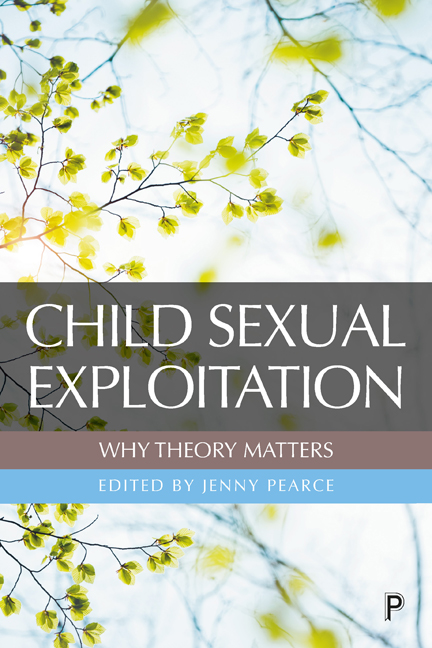Book contents
- Frontmatter
- Contents
- List of Figures and Tables
- Notes on Contributors
- Editor’s Acknowledgements
- Foreword
- 1 Bringing Theory Home: Thinking About Child Sexual Exploitation
- 2 Moving Beyond Discourses of Agency, Gain and Blame: Reconceptualising Young People’S Experiences of Sexual Exploitation
- 3 Child Sexual Exploitation, Discourse Analysis and why we Still Need to Talk About Prostitution
- 4 Contextual Safeguarding: Theorising the Contexts of Child Protection and Peer Abuse
- 5 ‘Losing Track of Morality’: Understanding Online Forces and Dynamics Conducive to Child Sexual Exploitation
- 6 Understanding Adolescent Development in the Context of Child Sexual Exploitation
- 7 Some Psychodynamic Understandings of Child Sexual Exploitation
- 8 Understanding Trauma and its Relevance to Child Sexual Exploitation
- 9 Social Support, Empathy and Ecology: A Theoretical Underpinning for Working with Young People who have Suffered Child Sexual Abuse or Exploitation
- 10 Using an Intersectional Lens to Examine the Child Sexual Exploitation of Black Adolescents
- 11 What’s Gender Got to do With It? Sexual Exploitation of Children as Patriarchal Violence
- 12 Understanding Models of Disability to Improve Responses to Children with Learning Disabilities
- 13 Some Concluding Thoughts
- Index
13 - Some Concluding Thoughts
Published online by Cambridge University Press: 10 March 2021
- Frontmatter
- Contents
- List of Figures and Tables
- Notes on Contributors
- Editor’s Acknowledgements
- Foreword
- 1 Bringing Theory Home: Thinking About Child Sexual Exploitation
- 2 Moving Beyond Discourses of Agency, Gain and Blame: Reconceptualising Young People’S Experiences of Sexual Exploitation
- 3 Child Sexual Exploitation, Discourse Analysis and why we Still Need to Talk About Prostitution
- 4 Contextual Safeguarding: Theorising the Contexts of Child Protection and Peer Abuse
- 5 ‘Losing Track of Morality’: Understanding Online Forces and Dynamics Conducive to Child Sexual Exploitation
- 6 Understanding Adolescent Development in the Context of Child Sexual Exploitation
- 7 Some Psychodynamic Understandings of Child Sexual Exploitation
- 8 Understanding Trauma and its Relevance to Child Sexual Exploitation
- 9 Social Support, Empathy and Ecology: A Theoretical Underpinning for Working with Young People who have Suffered Child Sexual Abuse or Exploitation
- 10 Using an Intersectional Lens to Examine the Child Sexual Exploitation of Black Adolescents
- 11 What’s Gender Got to do With It? Sexual Exploitation of Children as Patriarchal Violence
- 12 Understanding Models of Disability to Improve Responses to Children with Learning Disabilities
- 13 Some Concluding Thoughts
- Index
Summary
The chapters in this book aim to help us think about the relationship between theory and practice in our work with children and young people affected by CSE. In the opening introductory chapter, I was suggesting that we encourage ourselves to also think about when and why certain theories make sense to us, how they emerge in different political and economic environments and how our understanding of different theoretical perspectives may change according to our own lifecourse events, employment opportunities and geographical/environmental locations. Subsequent chapters then focused on a number of different theoretical perspectives that influence how CSE is defined, understood and responded to.
While the sexual exploitation of children is the focus of this book, the ideas within it can be used to explore a range of forms of exploitation and abuse of children. For example, the earlier chapters in the book look at how definitions have shifted away from children being ‘blamed’ for prostitution-related offences towards them being understood as victims of sexual offences perpetrated by others. Such changing constructions are now emerging for young people who might hitherto have been seen as young offenders, arrested for drug related offences. The current shift towards awareness of these young people's vulnerability to exploitation by organised criminal networks is, rightfully, taking referrals away from the criminal justice system and towards referral for family and community-based support and diversion. But some questions, also explored in the book, follow this change. Is the shift in definition being informed by a better understanding of the nature of adolescence as a stage in the lifespan and by the increasing awareness of the impact of trauma on children's development? Are we sophisticated enough to embrace the perspectives of young people who do not want to be perceived solely as ‘vulnerable’ and focus on them as both ‘victims’ of criminal exploitation and ‘agents’ of their own destiny, trying to survive poverty through action within the informal economy? If we do create a plethora of ‘vulnerable’ children in need of welfare-based support, do our children's services have the resources and capacity to respond through a lens informed by Contextual Safeguarding that asks child protection agencies to address the environment outside of the family home?
- Type
- Chapter
- Information
- Child Sexual Exploitation: Why Theory Matters , pp. 247 - 250Publisher: Bristol University PressPrint publication year: 2019



